Do You Know The Single Biggest Cause Of Most Sleep (And Energy) Struggles?
It’s a dysfunctional biological clock in your brain (a.k.a. your “Circadian Rhythm”)
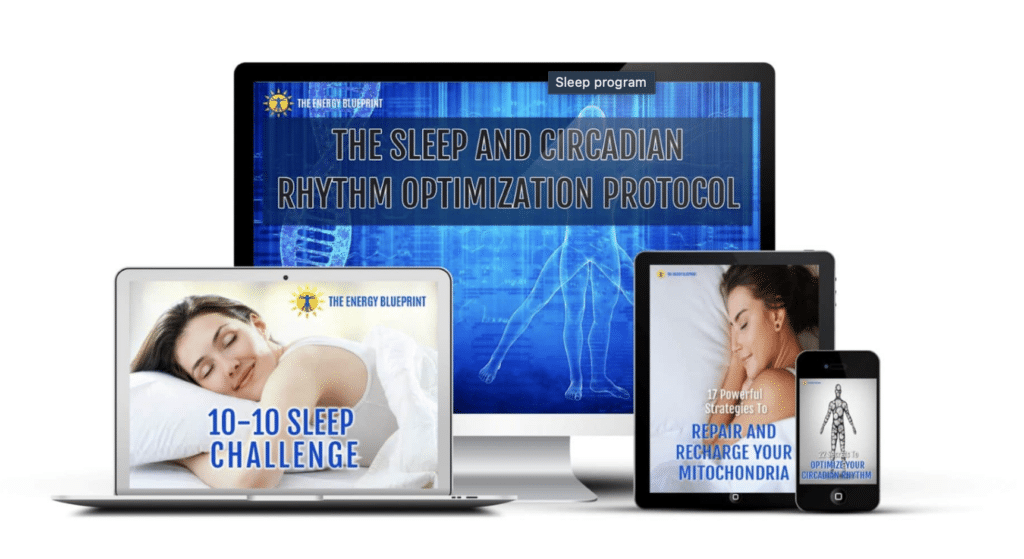
Welcome To The Most Powerful System Ever Developed For Fixing Your Sleep and Energy Struggles -- The Sleep and Circadian Rhythm Optimization Protocol
Take A Look At The Results People Are Getting With This Program
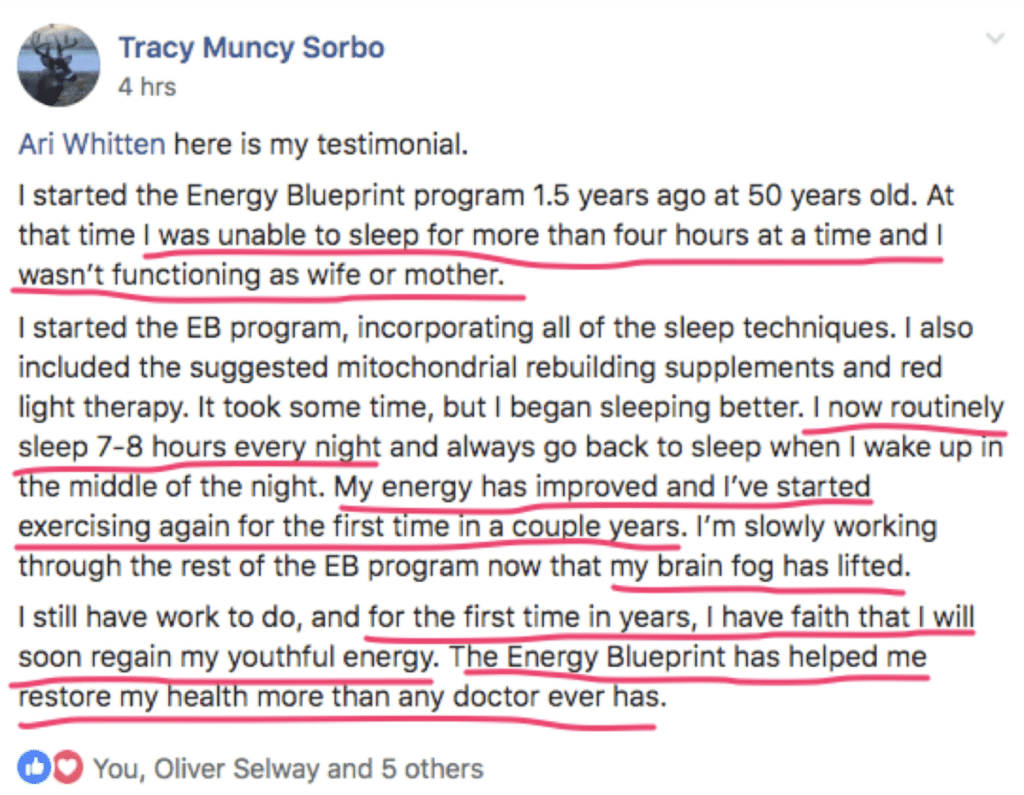
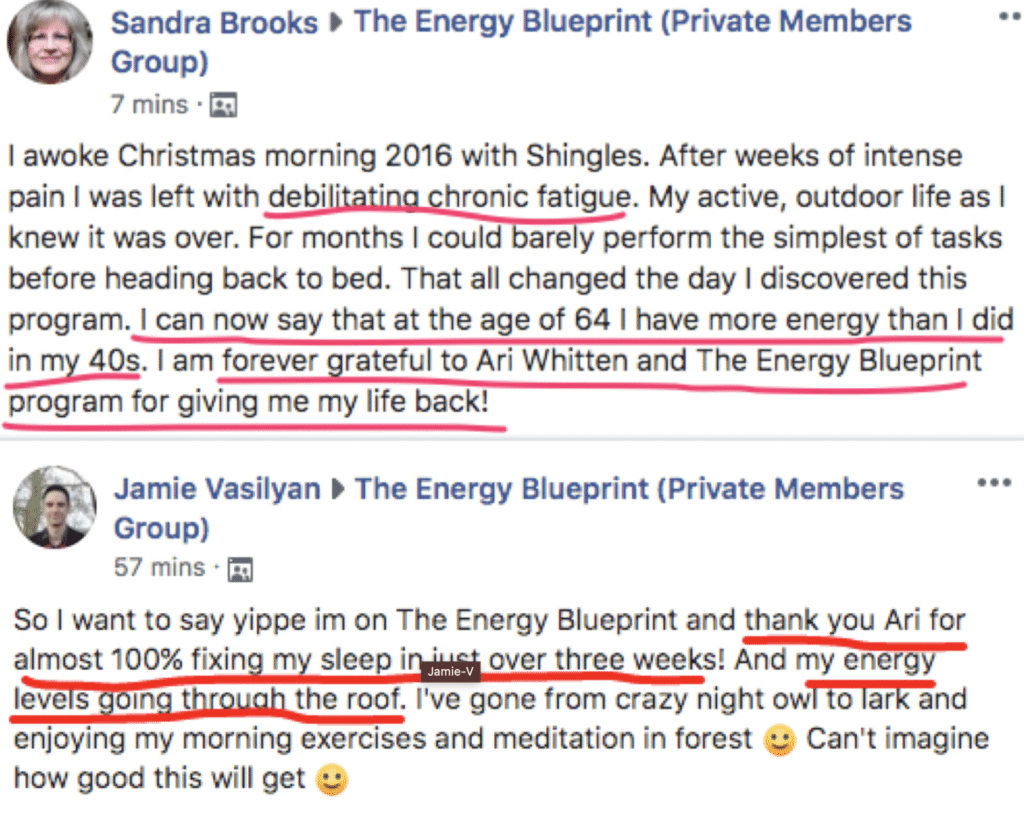
What Is Your Circadian Rhythm?
Your circadian rhythm is literally a 24-hour clock built into your brain, and it’s a major controller of dozens of hormones and neurotransmitters that control everything from your sleep to your energy levels, to your brain function, and even how fat or lean you are.
- Energy level
- Brain function
- Metabolic rate (“metabolism”)
- Body composition (how fat or lean you are)
- Mental and physical performance
- and much more!
And if you want to have amazing deep sleep and all-day energy, you NEED to know how to optimize your circadian rhythm.
Maybe you already KNOW your issue is sleep.
Or perhaps you’ve “tried everything”… But you’re still struggling with your health and energy…
Here’s the good news: Your CIRCADIAN RHYTHM (your body’s biological clock) is your hidden path to health.
And there are solutions!
Here are 5 Vitally Important Facts to Support You.
Fact #1: Optimizing Your Circadian Rhythm Is The Biggest Secret of Health, Energy, and Sleep Optimization
People talk about diet and exercise, and even talk about “getting your 7-8 hours of sleep.”
But here’s what they don’t know: Optimizing your circadian rhythm is a MAJOR KEY to amazing health, energy, and disease prevention.
And almost no one is talking about the keys to optimizing circadian rhythm.
I’ve spent over 10 years digging through over 6,000 studies on circadian rhythm science, and I’ve developed the most advanced scientific BLUEPRINT for optimizing your circadian rhythm in existence.
What Optimizing Your Circadian Rhythm With This System Does For You:
- Fix night-time awakenings
- Fix insomnia
- Dramatically increase your energy
- Fix trouble falling asleep due to a racing mind
- Boost your mood and brain function
- Dramatically decreases your risk of the major killers like heart diseases, diabetes, cancer and more
- Sleep deeper than you have in years or decades
- Wake up bursting with energy every morning!
This isn’t some insomnia gimmick – some new device claimed to fix your sleep that doesn’t actually work.
Nor is this just some sleeping pill, which seems like a good solution at first, but then you later find out that it stops working, and causes a whole bunch of nasty side effects.
This is literally the most advanced scientific protocol for sleep and circadian rhythm enhancement ever developed.
It is the science-proven path to rewiring your biology for deep sleep and amazing energy levels.
FACT #2 - The Single Biggest Cause Of Poor Sleep Is Disrupted Circadian Rhythm. And Almost EVERYONE Has A Dysfunctional Circadian Rhythm!
Our bodies respond to visual cues in our environment, chiefly light and darkness, to release hormones and neurotransmitters that either power us up and awake for daytime or prepare us for sleep and repair.
To simplify:
● Light = cue to the brain to be awake, alert, active and go into ENERGY mode
● Darkness = cue to the brain to be tired and go into SLEEP mode
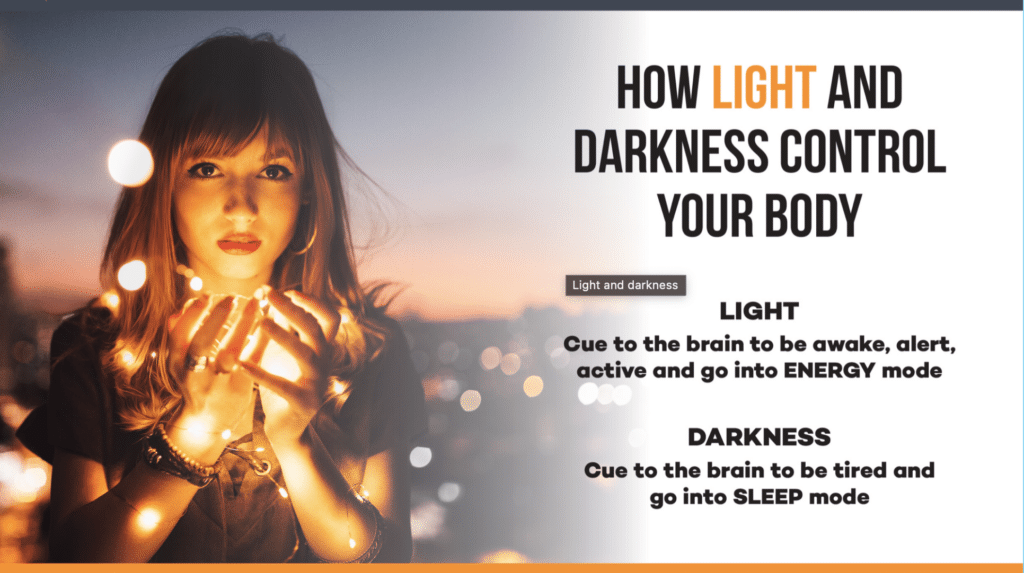
THE MODERN WORLD IS FUNDAMENTALLY NOT ALIGNED WITH OUR BIOLOGY, AND IS MESSING UP OUR BRAIN’S CIRCADIAN RHYTHM
So if this is how we’re biologically wired, then why is the system malfunctioning and causing sleep issues and fatigue?
The answer: Because the modern world we live in is fundamentally mismatched to the signals our biology – and our circadian rhythm in particular – is designed for.
See, humans are designed for an outdoor existence in tune with the rise and fall of the sun.
We’re not designed to be indoors almost all day, and then to be staring at all sorts of artificial light sources after the sun sets.
Simply put: Virtually all of us in modern society are suffering from one degree or another of circadian rhythm disruption.
In short…
We’re not getting enough of a Daytime/Energy Mode signal into our circadian clock in our brain during the daytime (when we should be getting it)
We’re getting way too much of a Daytime/Energy Mode signal at night (when we shouldn’t be getting it).
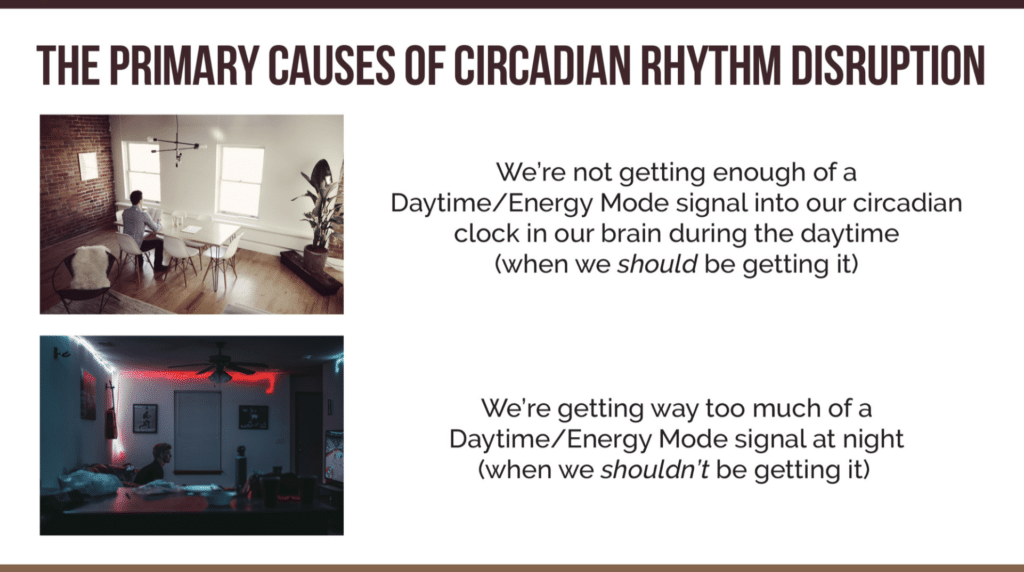
This may seem to be a trivial difference to you. But what if I told you that it is the difference between normal vs. abnormal levels of dozens of hormones and neurotransmitters that affect everything from your mood, to your metabolism, to how fat or lean you are, to clearing toxins out of your brain and body, to ridding the body of DNA-damaged cells (critical for preventing cancer), to your sleep, to your energy levels?
Would you still think it was trivial?
In fact, that is precisely what our circadian rhythm does.
The problem is so widespread that Harvard doctors recently published an article called “The Dark Side of Blue Light” where they talked about how the modern world is chronically disrupting our circadian rhythms.
Here’s a nice summary from researcher George Brainard, PhD:
“Humans evolved on a planet without electric light over thousands and thousands of generations. The body is designed to be alert and awake during daytime hours and to sleep at night. Now we have a 24-7 society that isn’t in harmony with our biological design.”
~ Professor George Brainard
Most people are sleeping 1-4 hours less than is optimal for health and energy. But there’s an even bigger problem: The QUALITY of the sleep has taken a huge hit.
Did you know that living with sleep deprivation, even for a short time, can have brutal effects on your physical and mental health?
Consider this:
● In 1910, the average American slept 9 hours per night.
● As of 2019, the average is just 6.8 hours per night.
Chronic, low-level sleep deprivation of not sleeping 1-4 hours as long as your body really needs is an epidemic.
But believe it or not, there’s something even worse going on…
… it’s not just the number of hours that have decreased, but the QUALITY of the sleep during those hours has also take a massive hit.
Why? Because of how the modern world causes our body’s biological clock (our “circadian rhythm”) to dysfunction.
It turns out that it’s not just the number of hours we sleep, but the QUALITY of the sleep during those hours. In other words, whether our brain can enter the phases of deep sleep that it needs for cellular regeneration.
What controls that?
Your circadian rhythm!
The single biggest factor behind the modern epidemic of insomnia and poor sleep, is very simple: Poor circadian rhythm habits, and living in an environment that is fundamentally at odds with our circadian rhythm.
Fact #3 - Dysfunction Of Our Circadian Rhythm Is The Single Biggest Cause Of Fatigue For People In The Modern World

Struggling with lack of energy during the day and poor sleep at night? It’s probably your circadian rhythm!
It’s not just sleep that suffers when your circadian rhythm is chronically disrupted — your ENERGY during the day also takes a massive hit.
This is because the circadian rhythm controls BOTH the hormones and neurotransmitters that control sleep at night AND the hormones and neurotransmitters that control wakefulness and ENERGY during the day.
That’s the other side of the circadian rhythm. It controls what happens in your body during both the darkness period and the daytime (light) period of the 24-hour day.
Basically, think of it like this…
Sleep and energy are two sides of the same coin – and they are connected via the circadian rhythm.
The circadian rhythm in your brain is designed to regulate neurotransmitters and hormones that impact BOTH how ENERGIZED you are during the day, AND how easily and deeply you sleep at night.
Our bodies respond to visual cues in our environment, chiefly light and darkness, to release hormones and neurotransmitters that either power us up and awake for daytime or prepare us for sleep and repair.
“Circadian rhythm is being tied to so many important functions. We’re just beginning to discover all the molecular pathways that this gene network regulates. It’s not just the sleep-wake cycle. There are system-wide, drastic changes.”
~ Joseph Takahashi (Neurobiologist)
As explained in this study titled “Life between Clocks: Daily Temporal Patterns of Human Chronotypes”:
“Our results predict that the timing of sleep has changed during industrialization and that a majority of humans are sleep deprived during the workweek. The implications are far-ranging concerning learning, memory, vigilance, performance, and quality of life.”[1]
But it’s not just hormones and neurotransmitters…
Your circadian rhythm also directly influences your actual cellular energy generators (your MITOCHONDRIA) that provide that energy to virtually all the trillions of cells in your body.
Melatonin is the most potent protector of your mitochondria. Most people know melatonin as a sleep-inducing hormone. And it is certainly that.
But most people have absolutely no idea that melatonin is absolutely vital for mitochondrial function, protects mitochondria from damage, and is vital for mitochondrial regeneration while we sleep. There are a number of impressive – and little known – studies showing how vital it is for mitochondrial health that you produce LOTS of melatonin each night while you sleep. The melatonin we release that prepares us for sleep nourishes the mitochondria in numerous ways including:
- Acts to prevent free radical damage directly in the actual mitochondria (which is very unique to melatonin since virtually all other “antioxidants” cannot do this)[2][3][4][5]
- Regulates of mitochondrial bioenergetic function and maintains respiratory complex activities, electron transport chain, and ATP production in mitochondria [6] [7] [8]
- Acts as a neuroprotectant in the brain, preventing the kind of oxidative stress/nitrosative stress-induced mitochondrial dysfunction seen in experimental models of Parkinson’s, Alzheimer’s, and Huntington’s disease [9]
- Slows aging [10][11]
And here’s the big problem:
When you have poor circadian rhythm habits, you have less melatonin in your body that can get to the mitochondria.
Too much blue light at night (and blunted circadian rhythm in general, from poor circadian rhythm habits) greatly inhibits melatonin release, which directly leads to grossly negative impacts upon mitochondrial dysfunction, causing mitochondrial fragility and die-off.[12][13][14]
Over time, what that means is that mitochondria will accumulate more damage, will not function as well, and you will not rebuild new healthy mitochondria nearly as well. You’ll be slowly accumulating more and more damaged and defective mitochondria, and inevitably, you will end up fatigued.
If we lose our mitochondria – or accumulate lots of weak and damaged mitochondria — we lose our health, energy, immunity, strength, and vitality as well. We age faster, we are far more susceptible to disease, and we end up chronically fatigued.
In short, think of it like this: Optimal circadian rhythm means deep, restful sleep, good mood, peak mental and physical performance, good body composition, leanness and high energy levels.
Disrupted circadian rhythm is the exact opposite. Sleep problems, insomnia, anxiety and depression. Poor brain performance, poor physical performance, tendency towards fat gain and chronic fatigue and energy problems.
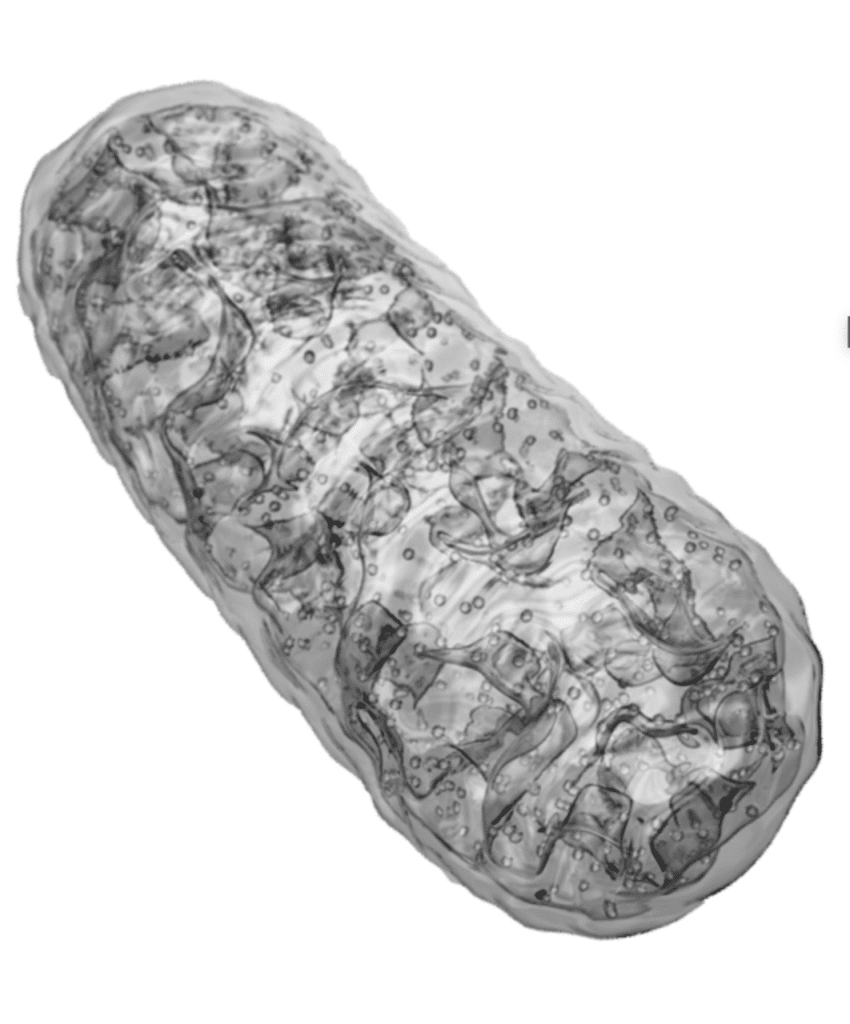
Fixing your circadian rhythm is the single fastest and most powerful strategy to dramatically increase your energy levels and improve your sleep.
FACT #4 - Disrupted Circadian Rhythm Slowly Eats Away At Your Brain — Dramatically Increasing Your Risk Of Depression, Anxiety And Even Brain Diseases Like Alzheimer’s And Dementia
One of the biggest problems with disrupted circadian rhythm is what it does to our brain.
There are several key mechanisms at play here:
- Brain cell repair and rejuvenation. Circadian rhythm controls the depth of your sleep, and the repair of neurons (brain cells) while you sleep. This is a process known as autophagy, where damaged cell parts are repaired and recycled to build new healthy cell parts. It is critical to health, brain function and disease prevention. So when your circadian rhythm is poor, your brain cells literally accumulate damage and become more dysfunctional over time.
- Protects neurons. Circadian rhythm controls the production of melatonin, which is not just a sleep hormone, but plays a critical role in protecting brain cells from damage.
- Toxin drainage. Circadian rhythm controls the drainage of toxins from your brain while you sleep (through the recently discovered “glymphatic system” of the brain).
- Neurotransmitters. Circadian rhythm directly impacts on the amount and balance of neurotransmitters in your brain like serotonin, dopamine, orexin, and GABA — which impact on your mood, stress level, irritability, sleep quality, anxiety, motivation, happiness, and ability to feel pleasure, and more.
There are numerous confirmed mechanisms by which disrupted circadian rhythm directly impairs the function of our brain and even directly damages the cells of the brain.
What does all of this ultimately mean for you?
- Depression and anxiety (People with chronic insomnia are 10 times as likely to suffer from clinical depression and 17 times as likely to have clinical anxiety)
- Anhaedonia (decreased ability to feel pleasure)
- Low productivity and poor ability to focus
- Dramatically increased risk of degenerative brain diseases(like dementia, Parkinson’s and Alzheimer’s disease)
- Brain fog and brain-related fatigue (feeling sleepy or fatigued following any cognitively demanding task)
In short, a disrupted circadian rhythm erodes away at your brain, impairing your mood, energy, quality of life, happiness, brain function for decades. And ultimately, dramatically increases your risk of brain diseases.
Fact #5 - Disrupted Circadian Rhythm Accelerates Aging, And Leads To Increased Risk of Dozens of Diseases, Including Heart Disease, Diabetes and Cancer
It is only in the last decade or so that the science on this subject has evolved to the point where we can really know exactly what sort of effect disrupted circadian rhythm is having, but the body of scientific literature is growing rapidly. And the results are not pretty.
How does a chronically disrupted circadian rhythm affect us?
Let’s look at the scientific studies!
Disrupted circadian rhythm has been shown to:
- Contribute to inflammatory diseases. And keep in mind that the majority of degenerative diseases from Alzheimer’s to heart disease to depression to diabetes to cancer are now linked with inflammation[15]
- Dramatically weaken your immune system. “There was a graded association with average sleep duration: participants with less than 7 hours of sleep were 2.94 times more likely to develop a cold than those with 8 hours or more of sleep [16]
- Increase risk of cancer, and metabolic syndrome[17] [18]
- Increase risk of cardiovascular disease. Studies indicate that even after adjustment for confounding factors, including age, gender, body mass index, current smoking status, hypertension, diabetes, dyslipidemia, sleep medication, estimated glomerular filtration rate, nocturia, bedtime, duration in bed (scotoperiod), day length (photoperiod), urinary 6-sulfatoxymelatonin excretion and daytime and nighttime physical activity, exposure to light at night is associated with carotid intima-media thickness.[19] Increase levels of stress hormones like cortisol.[20]Predispose to cancer, and accelerate tumor growth. Tumors grow two to three times faster in laboratory animals with severe sleep dysfunctions. “In the new study, scientists grafted human breast cancer tumors on rats and infused them with blood taken from women during the day, in the early hours of the morning, and after being exposed to light at night. The blood taken in darkness slowed the growth of the cancers by 80 percent, but the blood taken after exposure to light accelerated it”[21]
- Increase risk of psychiatric disorders and neurodegenerative diseases. “Disruption of sleep alters the sleep-wake timing, destabilizes physiology and promotes a range of pathologies (from cognitive to metabolic defects) that are rarely considered to be associated with abnormal sleep. We propose that brain disorders and abnormal sleep have a common mechanistic origin and that many comorbid pathologies that are found in brain disease arise from a destabilization of sleep mechanisms”[22]
- Seriously impair your memory. Even a single night of poor sleep can impact your ability to think clearly the next day and decrease your problem-solving ability
- Worsen a long list of other diseases and disorders. Including Hypothyroidism (i.e. slow metabolism), heart disease, stomach ulcers, constipation, mood disorders like depression and anxiety
- Accelerate the aging process[23]
- Profoundly decrease energy levels and increase daytime sleepiness and fatigue
- Dramatically increase your overall risk of dying from any cause
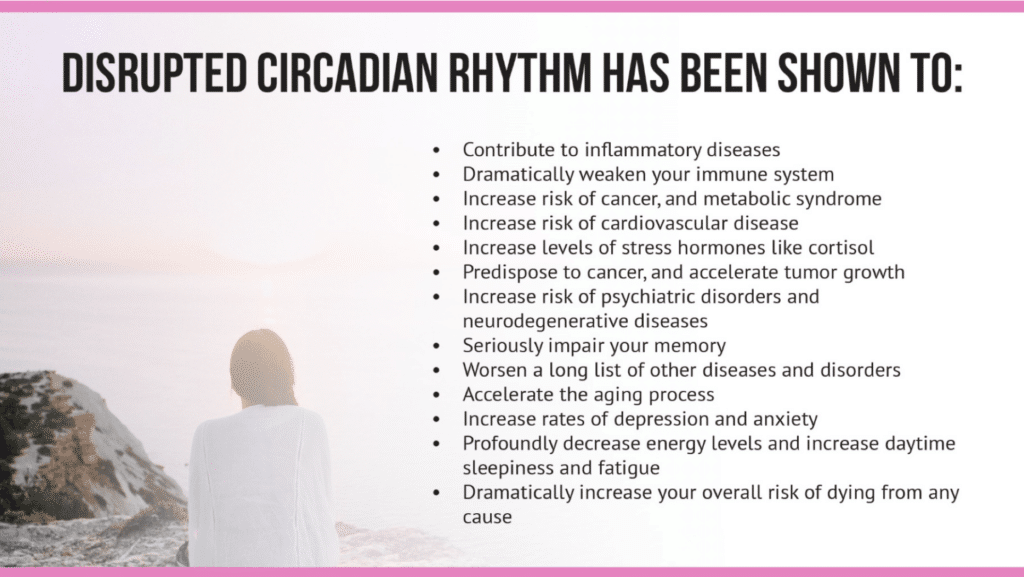
In short, when you don’t sleep enough and sleep deeply enough, your body and brain BREAK DOWN AND DYSFUNCTION, slowly eroding away at your quality of life.
LET ME HELP!
What You Get With The Sleep & Circadian Rhythm Optimization Protocol

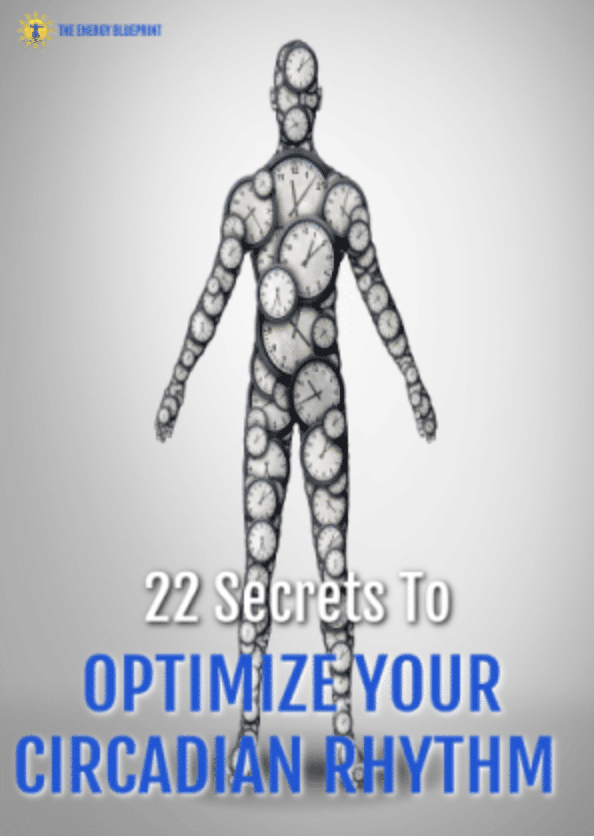
22 Secrets of optimizing your circadian rhythm
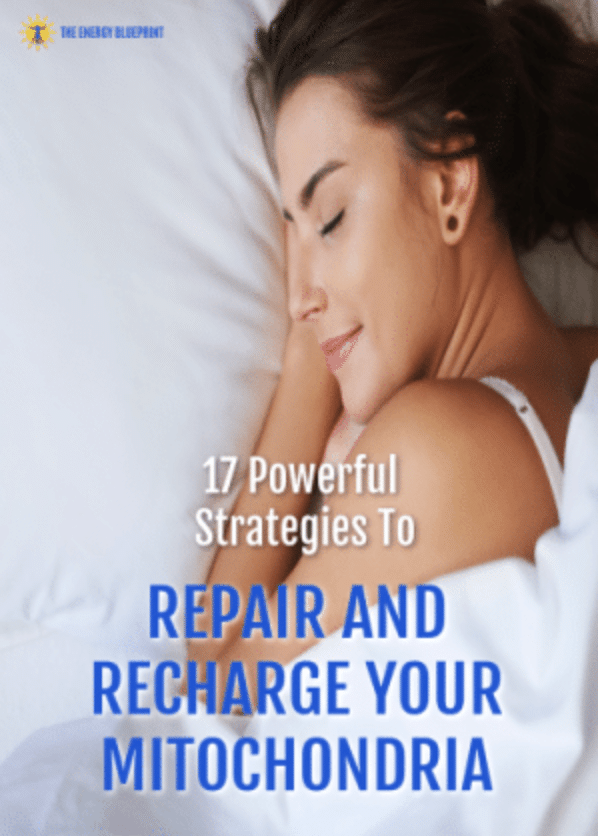
17 Powerful Strategies to enhance your sleep quality so you can maximize your sleep efficiency and rejuvenate your body more powerfully every night
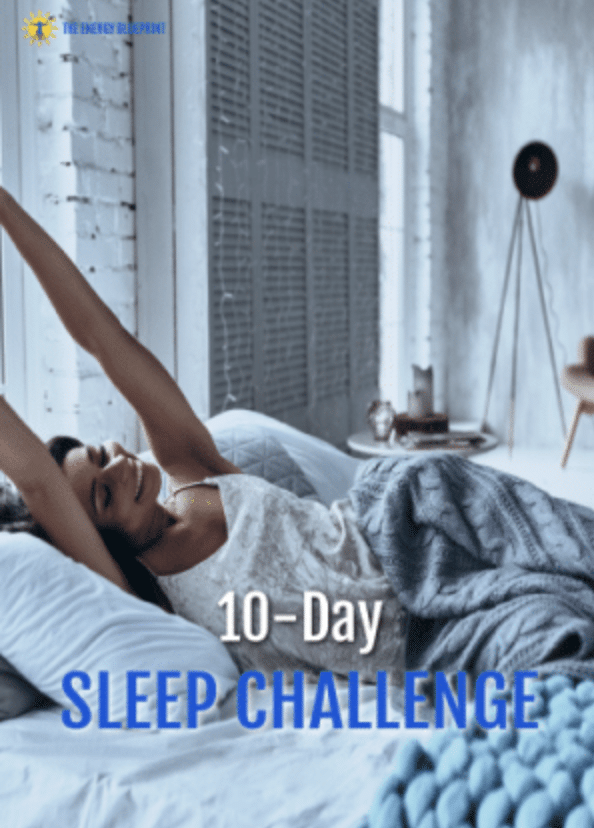
A 10-10 Sleep Challenge (10 habits for 10 days to dramatically transform your sleep)
Trying to Health Hack Energy?
Sleep and energy are two sides of the same coin – and they are connected via the circadian rhythm.
AND FAST FIXES ARE MAKING IT WORSE!! CAFFEINE AND ENERGY DRINKS AND “HACKS”…
When you force a fatigued body and dysfunctional mitochondria to pump out more energy (either through fiddling with neurotransmitters in the brain or causing the release of stress hormones), you PAY A PRICE FOR IT OVER TIME.
You are putting already an already fatigued and overworked brain and mitochondria under even MORE DEMANDS. So the body and brain actually become MORE FATIGUED over time.
If you’ve been struggling with insomnia, poor sleep quality, fatigue or low energy levels, it’s time to stop dragging yourself through the day with caffeine and stimulants…
It’s time to reset your most powerful built-in tool, your circadian rhythm and start building REAL ENERGY.
You can rebuild your internal antioxidant defense system!
And make your cells regenerate faster while you sleep
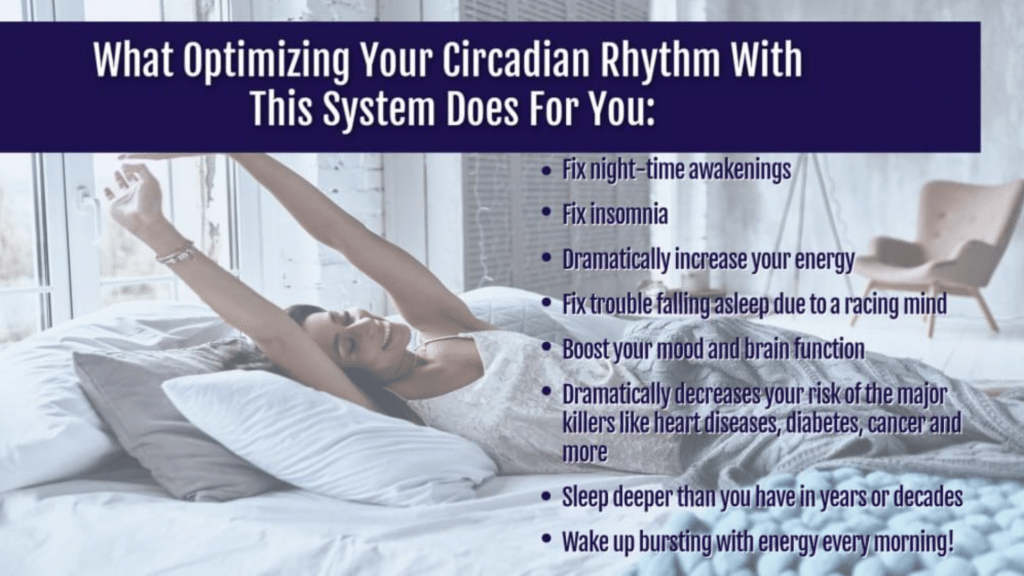
What This System Does For You:
- Sleep deeper than you have in years or decadesWake up bursting with energy every morning!
- Fix night-time awakenings
- Fix insomnia
- Dramatically increase your energy
- Fix trouble falling asleep due to a racing mind
- Dramatically boost your mood and brain function
- Protect your mitochondria from damage (note: mitochondrial damage is a key driver of fatigue, and of aging itself)
- Dramatically decreases your risk of the major killers like heart diseases, diabetes, cancer and more
This is the most advanced circadian rhythm and sleep protocol ever developed.
If you have been struggling with poor sleep and daytime sleepiness/fatigue, this is your ticket to a better life!
What Kind Of Results Are People Getting With This System?
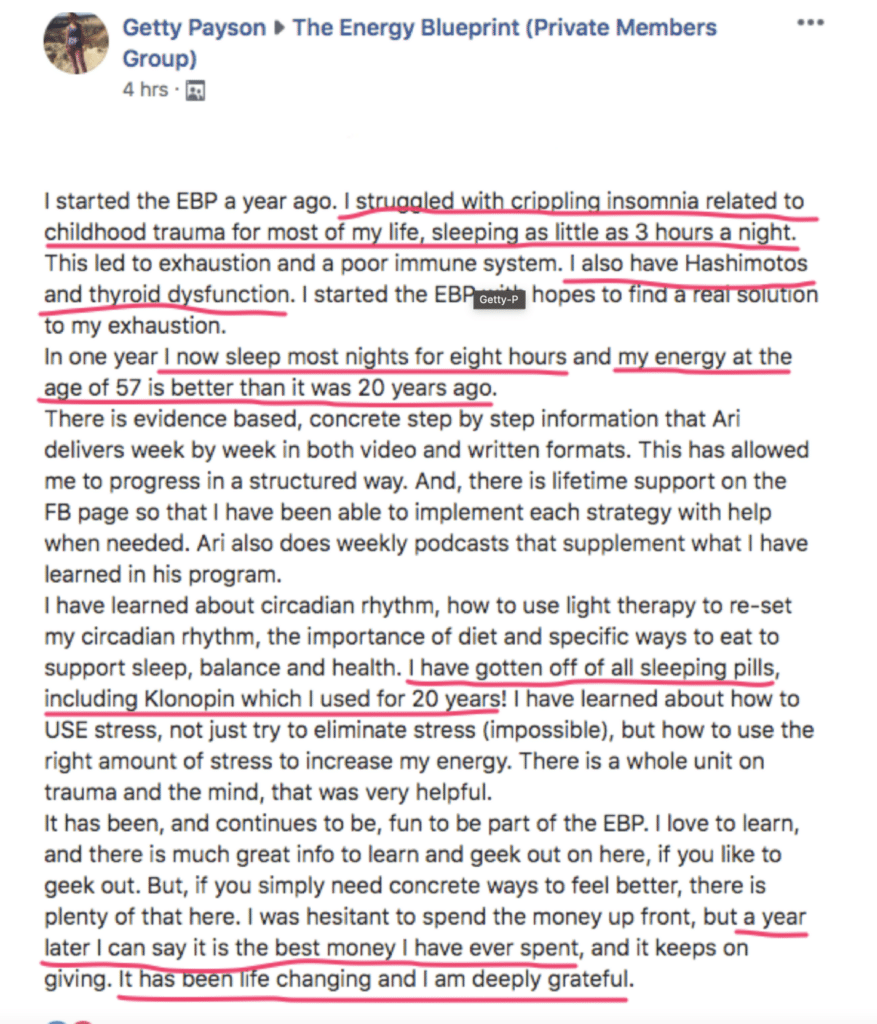

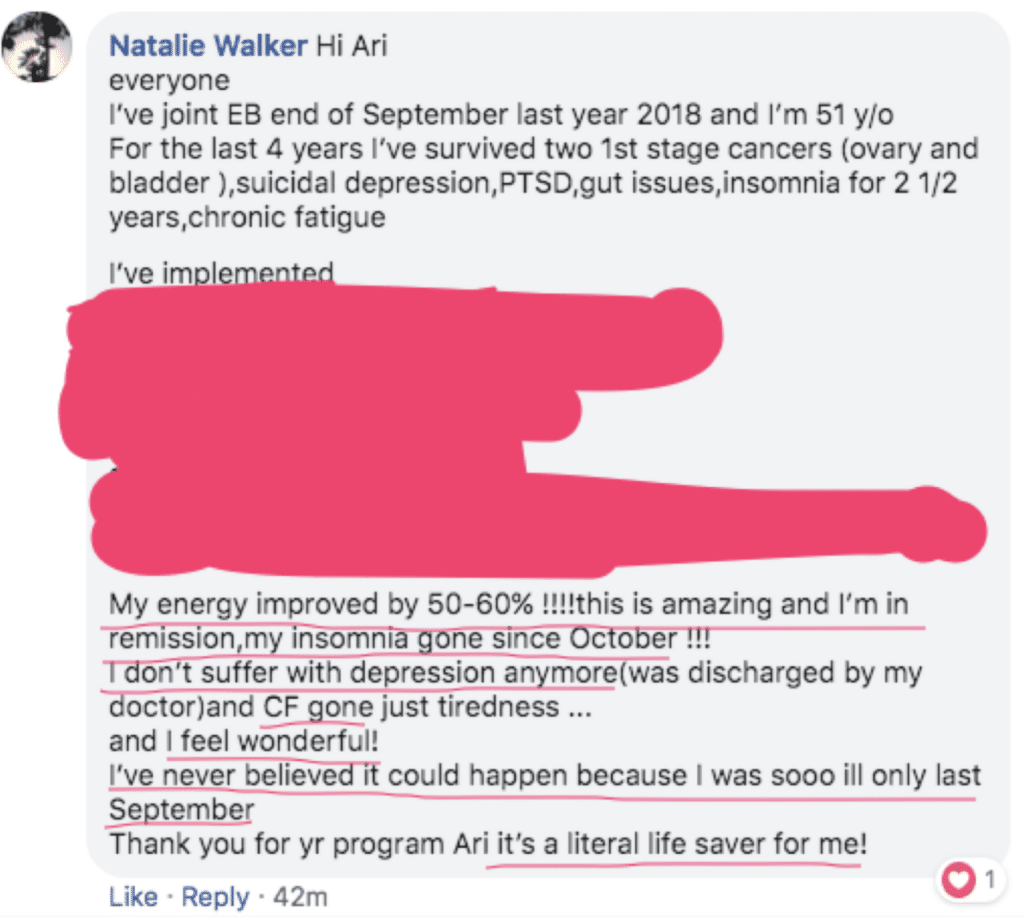
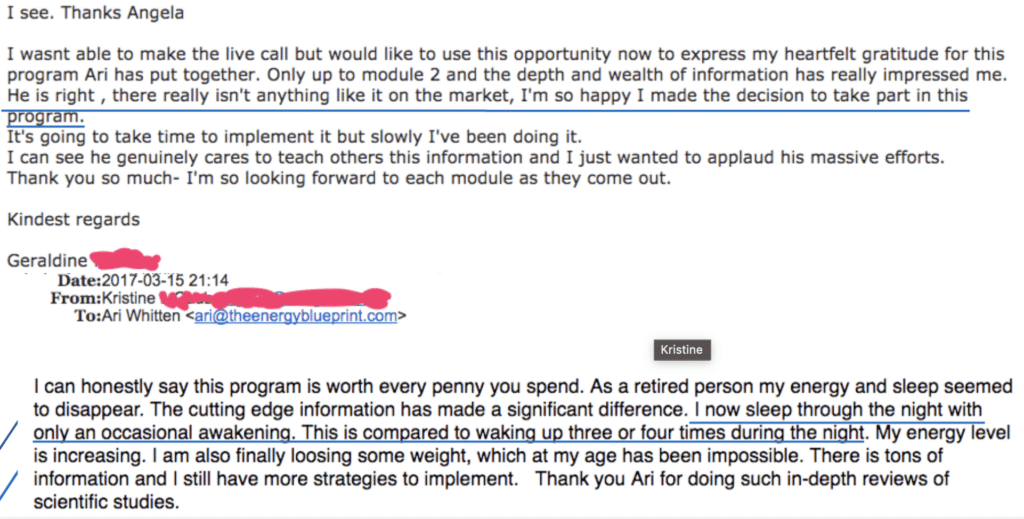
What's in the program

22 Secrets of optimizing your circadian rhythm

17 Powerful Strategies to enhance your sleep quality so you can maximize your sleep efficiency and rejuvenate your body more powerfully every night

A 10-10 Sleep Challenge (10 habits for 10 days to dramatically transform your sleep)
References
[1] Roenneberg. T. et. al. (2003) Life between clocks: daily temporal patterns of human chronotypes.
[2]Venkatramanujam, S. (2011). Melatonin in Mitochondrial Dysfunction and Related Disorders. International Journal of Alzheimer’s Disease.
[3]Hardeland, R.,(2003). Oxidation of melatonin by carbonate radicals and chemiluminescence emitted during pyrrole ring cleavage. Journal of Pineal Research. 34(1):17-25.
[4]Reiter RJ, et. al. (2003). Melatonin as an antioxidant: biochemical mechanisms and pathophysiological implications in humans. Acta Biochim Pol., 50(4):1129-46.
[5] Hardeland R,. (1993). The significance of the metabolism of the neurohormone melatonin: antioxidative protection and formation of bioactive substances. Neuroscience and Biobehavioral Reviews. 17(3):347–357.
[6]Hardeland R,. (1993). The significance of the metabolism of the neurohormone melatonin: antioxidative protection and formation of bioactive substances. Neuroscience and Biobehavioral Reviews. 17(3):347–357.
[7]Hardeland R,. (1993). The significance of the metabolism of the neurohormone melatonin: antioxidative protection and formation of bioactive substances. Neuroscience and Biobehavioral Reviews. 17(3):347–357.
[8]Leon, J, Acuña-Castroviejo, D., et. al. (2011). Melatonin and mitochondrial function. Current Topics in Medicinal Chemistry, 11: 221–240.
[9] Castroviejo DA, et. al. (2011) Melatonin-mitochondria interplay in health and disease. Current Topics in Medicinal Chemistry.
[10]Rodríguez, M.I., Escames, G., and L. C. López. (2008). Improved mitochondrial function and increased life span after chronic melatonin treatment in senescent prone ice. Experimental Gerontology. 43(8):749–756.
[11] Venkatramanujam, S. (2011). Melatonin in Mitochondrial Dysfunction and Related Disorders. International Journal of Alzheimer’s Disease.
[12]Andres, A. (2015). A time to reap, a time to sow: Mitophagy and biogenesis in cardiac pathophysiology. Journal of Molecular and Cellular Cardiology, 78: 62-72
[13]Ma, D. et. al. (2012). Circadian autophagy rhythm: a link between clock and metabolism? Trends in Endocrinology and Metabolism, 23: 319-325
[14]Godley, B. F. (2005). Blue light induces mitochondrial DNA damage and free radical production in epithelial cells. Journal of Biology and Chemistry, 280(22): 21061-6.
[15]Medical News Today (2014) How can disrupting circadian rhythms contribute to inflammatory disease?
[16]Cohen. S. et. al. (2009) Sleep habits and susceptibility to the common cold.
[17]Shanmugam. V. et. al. (2013) Disruption of circadian rhythm increases the risk of cancer, metabolic syndrome and cardiovascular disease
[18] Maury. E. et.al. (2010) Circadian Rhythms and Metabolic Syndrome
[19] Obayashi, K. et. al. (2014) Light exposure at night is associated with subclinical carotid atherosclerosis in the general elderly population: The HEIJO-KYO cohort
[20] International Journal of Endocrinology (2015) The Impact of Sleep and Circadian Disturbance on Hormones and Metabolism
[21]Chepesiuk R., (2009) Missing the Dark: Health Effects of Light Pollution
[22]Wulff, K. et. al. (2010) Sleep and circadian rhythm disruption in psychiatric and neurodegenerative disease.
[23]Science Daily (2013) Sleep deprivation linked to aging skin, study suggest


